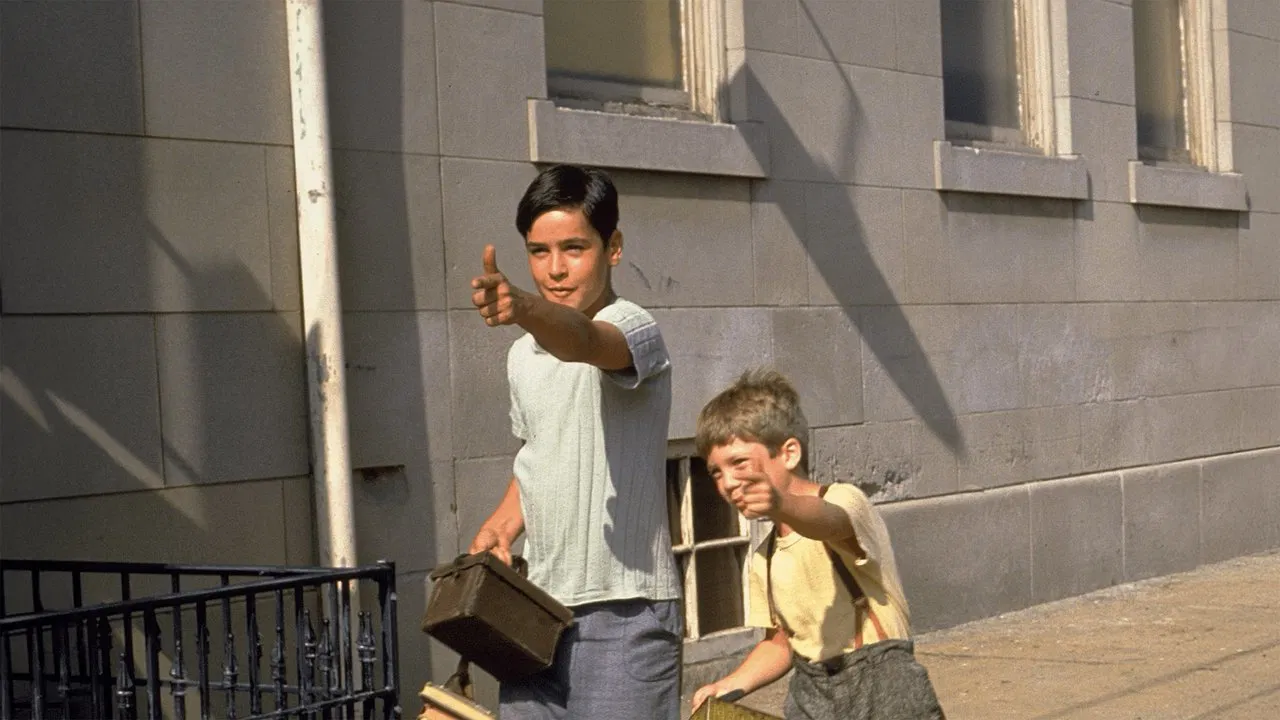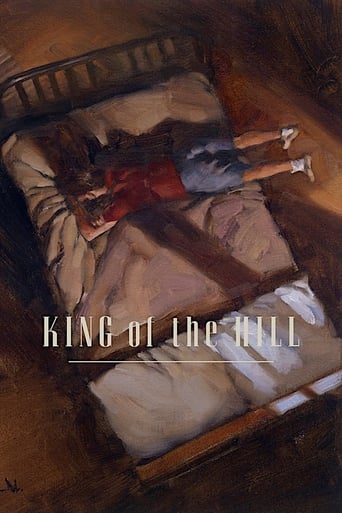

Best movie of this year hands down!
... View MoreWhat a beautiful movie!
... View MoreSorry, this movie sucks
... View MoreHow wonderful it is to see this fine actress carry a film and carry it so beautifully.
... View MoreWhenever I watch this film, I find myself days later still being haunted by certain scenes. I can't believe that I had never even heard of this movie until I accidentally recorded it off HBO when trying to record the TV show of the same name. I love the unhurried pace of the film; I love how much is conveyed in people's faces. When the father returns home and Aaron is clearly angry with him, the father acknowledges and apologizes, and Aaron forgives, without a word being spoken. Absolutely brilliant.The scenes that haunt me are those of Aaron being so hungry. I've never been hungry in my life, but the image of him eating yet another dinner roll nearly brings me to tears.The last thing I'll add is that it's so refreshing to see a film set in an American city other than New York. Nothing against the Big Apple, but it's nice to have a different backdrop.
... View MoreIn the mid 1990s, a streak of coming-of-age flicks were released, each trying to emulate the tone and style of Rob Reiner's "Stand by me" (1986). "Stand by Me" led to the TV series "The Wonder Years" (1988) which led to Woody Allen's "Radio Days", "Brighton Beach Memoirs", "Man in the Moon" (1991), "Radio Flyer" (1992), "Jack the Bear" (1993), "This Boys Life" (1993), "Searching For Bobby Fisher" (1993), "King of the Hill", "American Heart", "Now and Then" (1995), "Unsung Heroes" (1995), "The Mighty" (1998), "Simon Birch" (1998) etc.These films all employed a romantic visual style which recalled the paintings of Norman Rockwell. They featured older and wiser narrators who reminisced about their childhood days, revolved around small groups of young boys, largely took place in the 1960s and early 70s, and oozed a sense of nostalgia.Essentially, these films were also about the same thing: escape. These kids (or rather their future adult/narrator selves) are all searching for a romanticised version of America. A forgotten - or perhaps nonexistent - age of white picket fences, carefree wandering, pop sodas and family dinners. Behind all this comfortable nostalgia, though, is a palatable sense of menace. Abuse, suicide, murder, the lingering effects of the Vietnam war and drunken fathers, all linger in the background. This trend started in the 1980s, by artists who were born post WW2 and became young men in the turbulent 60s. By the late 1990s the "unseen enemy" of these films stopped being about war, poverty, absent fathers, abuse and alcoholism, and started to be about disease and genetic disorders. Though fading, the idealised Norman Rockwell version of Americana was still there, but now Generation X seemed to obsess over diseases and genetics. For Generation X, misery seemed to be all about ailments and genetic predisposition, like the kids with Morquio's syndrome in "The Mighty" and "Simon Birch" or AIDS in "The Cure"."King of the Kill", a little known film by Steven Soderbergh, is however quite different from all the other films in this wave. Directed by a young man, the film is set in St Louis during the Great Depression, and focuses on a young school boy called Aaron who uses his wits to survive the economic hardships of 1930's America.An imaginative and creative boy, Aaron must survive on his own when his father abandons him, his mother is locked away in a mental hospital and his little brother is sent off to boarding school. Initially Aaron takes to these dilemmas with strong shoulders, but gradually his harsh world begins to suffocate him. He has no food, he's in constant fear of losing his apartment and is mocked by his classmates for being poor. Every misery and mishap imaginable seems to happen to Aaron, but the film, despite being shot in sepia hues, never becomes maudlin or implausible. Soderbergh lets the film unfold like Truffaut, mixing tragedy with a very sensitive, deft touch. Now at first glance the film seems to be celebrating resilience, creativity and that good ole American Spirit. Indeed, the film begins with Aaron reading a story he wrote about Charles Lindberg and the Spirit Of St Louis, the first man and plane to cross the Atlantic. Aaron, like Charles, is a symbol of heroism, persistence, national pride and creativity, a man/boy who triumphs despite the odds.But look closer and something darker seems to be going on. Aaron thinks up a genius scheme to sell birds to make money, but his birds are the wrong sex and aren't worth anything. Aaron then schemes to find the perfect clothes for a school function (in which he wins a top prize), but despite succeeding is teased by his classmates. Aaron, starving and hungry for food, then has enough imagination to cut out pictures of food from a book, but when he eats them, gets sick the following day. Likewise, Aaron is promised food at a restaurant, but the manager refuses the deal and callously turns him away.Now think back to Aaron's scheme to breed birds and sell them for their money. Aaron takes the birds to a pet store and attempts to sell them, at which point the store owner tells him the birds are worthless because of their sex. Aaron agrees and walks away, the camera lingering suspiciously on the store owner for a moment. In an instant we know that this boy is being taken advantage of, and that the store owner stands to gain far more than the boy will.The end result is that the "Spirit of St Louis" is not celebrated, but shown to be the cause of hardship. For one to triumph, another must suffer. For the poor man in the shop to make money, he must rip off a little kid. For a restaurant owner to stay in business, a poor boy must go hungry. In other words, The Great American Spirit is itself a selfish, debased thing, a grand cycle of victors triumphing over others. This, of course, flies in the face of the doctrines and myths espoused by every free-market fundamentalist, despite being backed up by every post neoclassical economist who charts the thermodynamic properties of debt-issued currency. Currency, by the way, is Soderbergh's unacknowledged obsession ("The Girlfriend Experience", "Side Effects", "Contagion", "Che", "Magic Mike", the "Ocean" movies etc).8/10 – Worth one viewing. See "Seven Beauties".
... View MoreI enjoyed this movie more than I thought I would. This is an evocative tale of life before food banks and the welfare system. Watching the young protagonist pretend he enjoyed eating his "delicious" cut-from-a-magazine food was pretty poignant. The performances put in by the young actors are believable without being too sappy. Jesse Bradford is charming. Also worth seeing is Adrien Brody. He sparkles with a to-the-gut vitality. But in the end it is the kid's grit and determination that holds this movie together. His pride in himself and his dogged pursuit of his creativity, integrity and ingenuity makes this movie worth seeing. A great scene to be on the look out for is when the beautiful gum-snapping elevator girl gives the young Aaron a graduation gift. In addition, I especially enjoyed John McConnell's performance as the mean "Big Butt" cop. I'm pretty sure he was also in the recent Ladykillers with Tom Hanks. He's fun to watch.
... View MoreThis is a beautiful movie about an enterprising young man who survives various hardships during the depression. It has a bitter edge but isn't excessive and brings back tales of my grandmother's of how her family coped during the depression. My grandmother's parents were far more functional than the frail ill mother and the traveling salesman father who basically abandons his child to work out of state. I agree with other comments it hardly seems American because it is so deep without smashing the hammer down on our heads. Even though it is harsh I think it is suitable for older children if nothing more than an abject lesson about how real and difficult life really was. The irony is that America still exists to a lesser degree we just don't see it in the movies or on TV.
... View More